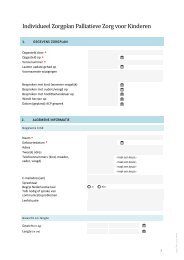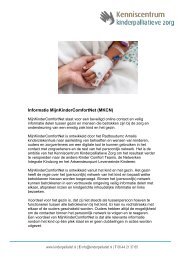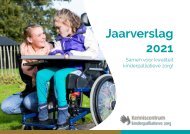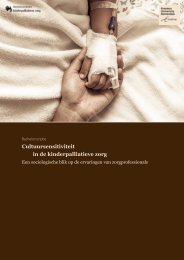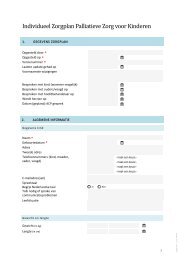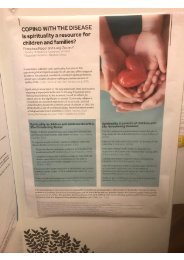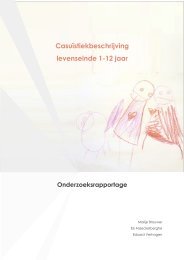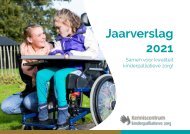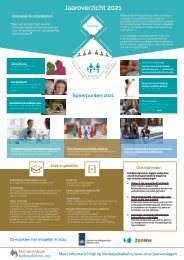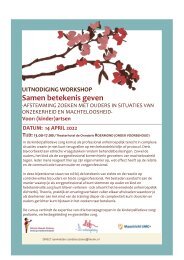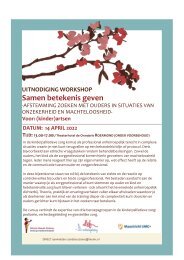EAPC Atlas of Palliative Care in Europe 2019
Conclusion: PC health policies developed in recent years have promoted vigorous development across Europe. Preliminary data on the integration of PC into different fields are encouraging though inequalities between countries and sub-regions persist. Further comparative analysis exploring factors leading to uneven progress may inform strategies to provide PC for all people in need. Per land is de stand van zaken van de (kinder)palliatieve zorg weergegeven.
Conclusion: PC health policies developed in recent years have promoted vigorous development across Europe. Preliminary data on the integration of PC into different fields are encouraging though inequalities between countries and sub-regions persist. Further comparative analysis exploring factors leading to uneven progress may inform strategies to provide PC for all people in need.
Per land is de stand van zaken van de (kinder)palliatieve zorg weergegeven.
You also want an ePaper? Increase the reach of your titles
YUMPU automatically turns print PDFs into web optimized ePapers that Google loves.
EUROPEAN CONTEXT<br />
Chapter 7. Integration <strong>of</strong> <strong>Palliative</strong> <strong>Care</strong><br />
<strong>in</strong> Long-Term <strong>Care</strong> Facilities <strong>in</strong> 18 <strong>Europe</strong>an countries<br />
B<br />
TechnicaL data<br />
ON THE <strong>2019</strong> <strong>EAPC</strong><br />
SURVEY ON<br />
PALLIATIVE CARE IN<br />
LONG-TERM FACILITIES<br />
Population: 54 countries <strong>of</strong> the<br />
<strong>Europe</strong> WHO region and Lichtenste<strong>in</strong>.<br />
Survey Details<br />
Areas explored: 7 ma<strong>in</strong> <strong>in</strong>dicators<br />
for long-term care facilities<br />
(LTCFs): Existence <strong>of</strong> <strong>of</strong>ficial documents<br />
regulat<strong>in</strong>g PC <strong>in</strong>terventions<br />
and its provision; tra<strong>in</strong><strong>in</strong>g<br />
<strong>in</strong> PC; publications regard<strong>in</strong>g<br />
the provision <strong>of</strong> PC; collaboration<br />
with PC teams; availability <strong>of</strong><br />
national funds.<br />
Questionnaire: on l<strong>in</strong>e survey, 17<br />
questions, answered <strong>in</strong> (average):<br />
27 m<strong>in</strong>utes.<br />
Participants: 25 national<br />
experts: 6 identified <strong>in</strong> the <strong>EAPC</strong><br />
TaskForce on LTCFs or <strong>EAPC</strong><br />
report, 5 <strong>in</strong> LTCF-related publications,<br />
9 recommended by PC<br />
experts and rema<strong>in</strong><strong>in</strong>g 5 are from<br />
Universities, PC research centres,<br />
or PC services´ contexts.<br />
Coverage: 18/54 countries<br />
(33%): with two respondents or<br />
over <strong>in</strong> 5/18 countries (28%),<br />
and one respondent <strong>in</strong> 13/18<br />
countries (72%).<br />
Data collection: 12/2018 to<br />
3/<strong>2019</strong> (4 months).<br />
Project Management: ATLANTES<br />
Research Group, Institute for Culture<br />
and Society, University <strong>of</strong> Navarra,<br />
Pamplona (Navarra), Spa<strong>in</strong> .<br />
Scientific Advice: Kather<strong>in</strong>e Froggatt<br />
(UK) and Lieve Van den Block<br />
(Belgium).<br />
Promotor: <strong>Europe</strong>an Association<br />
for <strong>Palliative</strong> <strong>Care</strong> (<strong>EAPC</strong>).<br />
Long-term care facilities are collective <strong>in</strong>stitutional sett<strong>in</strong>gs <strong>in</strong><br />
which care is provided to older people on-site 24 hours a day, 7 days<br />
a week, <strong>in</strong>clud<strong>in</strong>g facilities with on-site and <strong>of</strong>f-site nurses and medical<br />
staff. This term <strong>in</strong>cludes a range <strong>of</strong> facilities <strong>of</strong>fer<strong>in</strong>g different<br />
levels <strong>of</strong> social and health care (Froggatt et al, 2017).<br />
The first study on how palliative care<br />
(PC) is <strong>in</strong>tegrated <strong>in</strong>to Long Term <strong>Care</strong><br />
Facilities (LTCFs) <strong>in</strong> <strong>Europe</strong> was developed<br />
<strong>in</strong> 2013 by the <strong>Europe</strong>an Association<br />
<strong>of</strong> <strong>Palliative</strong> <strong>Care</strong> (<strong>EAPC</strong>) (1). Thereafter, <strong>in</strong><br />
2015, the PACE project (Compar<strong>in</strong>g the effectiveness<br />
<strong>of</strong> PATIENT CARE for older people <strong>in</strong> LTCFs)<br />
provided an overview <strong>of</strong> mapp<strong>in</strong>g PC systems <strong>in</strong><br />
LTCFs <strong>in</strong> <strong>Europe</strong> (2). This chapter <strong>in</strong>tends to evaluate<br />
the current state <strong>of</strong> PC <strong>in</strong>tegration <strong>in</strong>to LTCFs<br />
<strong>in</strong> the WHO <strong>Europe</strong>an Region build<strong>in</strong>g on previous<br />
experiences through the use <strong>of</strong> similar <strong>in</strong>dicators.<br />
PC provision <strong>in</strong> LTCFs<br />
LTCFs can seek advice from <strong>Palliative</strong> <strong>Care</strong> teams<br />
to better address the patient <strong>in</strong> terms <strong>of</strong> pa<strong>in</strong><br />
and symptom management, specific needs<br />
and family support. In <strong>Europe</strong>, this collaboration<br />
between PC teams and LTCFs staff varies<br />
<strong>in</strong> its frequency. Lithuania and Kyrgyzstan report<br />
that cooperation “always” exist <strong>in</strong> their practice,<br />
at the time that Belgium and Austria also consider<br />
that this partnership happens “most <strong>of</strong> the<br />
time”. Countries such as the Czech Republic,<br />
Israel, Russia, Italy, and Armenia admit a hardly<br />
<strong>of</strong>ten to non-existent/never collaboration frequency.<br />
A vast majority <strong>of</strong> <strong>Europe</strong>an countries<br />
though (9/18) po<strong>in</strong>t out occasional collaborations<br />
(Greece, Denmark, Poland, The Netherlands,<br />
France, Switzerland, UK, Germany, Spa<strong>in</strong>).<br />
Regulation <strong>of</strong> PC provision <strong>in</strong> LTCFs<br />
<strong>Palliative</strong> <strong>Care</strong> provision is <strong>of</strong>ten regulated by<br />
documents with national validity, usually referr<strong>in</strong>g<br />
to structural features that should be available<br />
<strong>in</strong> LTCFs such as personnel, beds, materials,<br />
etcetera. Ten <strong>Europe</strong>an countries <strong>in</strong>form<br />
hav<strong>in</strong>g national strategies, plans or policies,<br />
Carla Reigada , Kather<strong>in</strong>e Froggatt, Lieve Van den Block.<br />
and eight state hav<strong>in</strong>g standards <strong>of</strong> quality provision<br />
<strong>of</strong> PC services. Likewise, 11/18 countries<br />
report hav<strong>in</strong>g some sort <strong>of</strong> guidel<strong>in</strong>es or protocols,<br />
either as <strong>of</strong>ficial protocols (four countries)<br />
or other non-<strong>of</strong>ficial documents actually modulat<strong>in</strong>g<br />
palliative care provision <strong>in</strong> long-term care<br />
facilities <strong>in</strong> the country.<br />
Fund<strong>in</strong>g For PC provision <strong>in</strong> LTCFs<br />
Less than half <strong>of</strong> report<strong>in</strong>g countries (7/18)<br />
<strong>in</strong>form hav<strong>in</strong>g national fund<strong>in</strong>g available to<br />
support the provision <strong>of</strong> <strong>Palliative</strong> <strong>Care</strong> <strong>in</strong> LTCFs.<br />
Fund<strong>in</strong>g models vary from grants, prizes and<br />
loans, to the reception <strong>of</strong> an annual economic<br />
support. Specifically, five countries state gett<strong>in</strong>g<br />
an annual national support which occur <strong>in</strong> different<br />
ways. Some countries have a contract with<br />
the National Health Fund and get a donation for<br />
hospices, others report hav<strong>in</strong>g regional economic<br />
rates from regional health and social-care funds,<br />
or others where PC at LTCFs is entirely public.<br />
PC tra<strong>in</strong><strong>in</strong>g <strong>in</strong> LTCFs<br />
The estimation <strong>of</strong> LTCFs staff with PC tra<strong>in</strong><strong>in</strong>g is<br />
over 90% <strong>in</strong> Lithuania, followed by Kyrgyzstan,<br />
Poland, The Netherlands, Belgium, France, Switzerland<br />
and the UK (rang<strong>in</strong>g from 40% to 90%).<br />
Half <strong>of</strong> the report<strong>in</strong>g countries do not reach a<br />
40% ratio <strong>in</strong> terms <strong>of</strong> staff´s PC tra<strong>in</strong><strong>in</strong>g. Furthermore,<br />
12/18 countries confirm the existence <strong>of</strong><br />
national studies on the provision <strong>of</strong> PC <strong>in</strong> LTCFs<br />
and another seven countries declare their participation<br />
<strong>in</strong> an <strong>in</strong>ternational project on PC provision<br />
<strong>in</strong> LCTFs (Lithuania, Belgium, Poland, The<br />
Netherlands, Switzerland, UK, Italy).<br />
<strong>EAPC</strong> <strong>Atlas</strong> <strong>of</strong> <strong>Palliative</strong> <strong>Care</strong> <strong>in</strong> <strong>Europe</strong><br />
73




